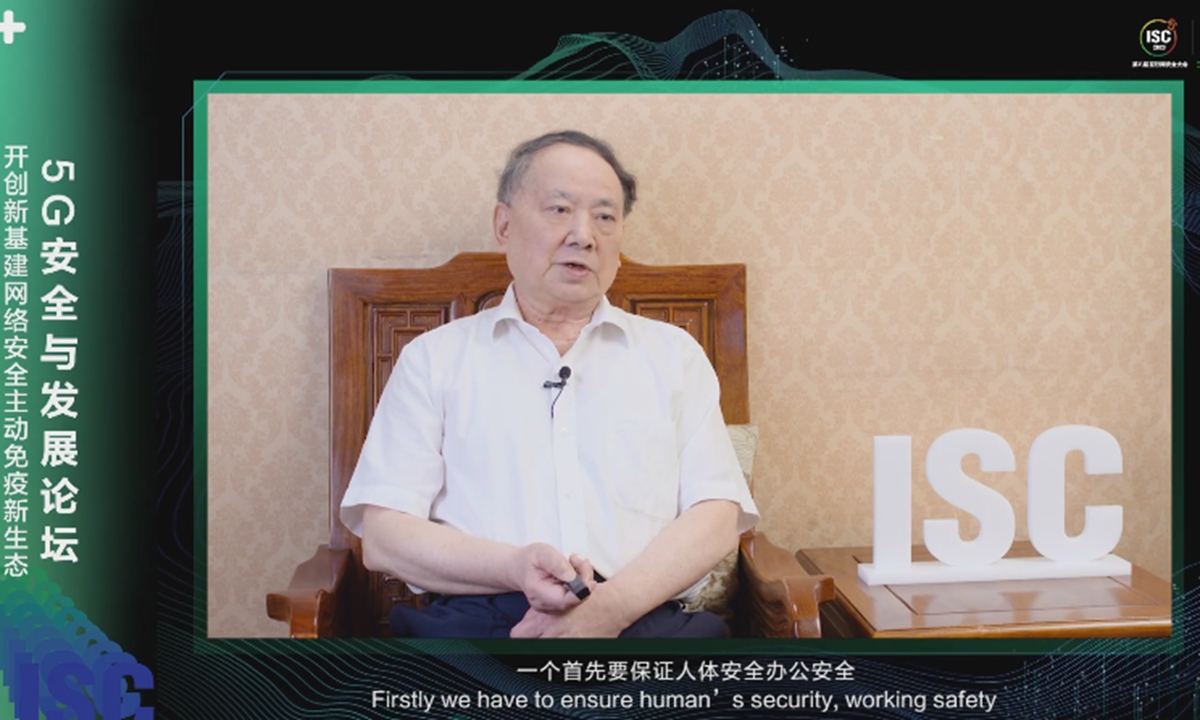Chinese academician warns of 'nuclear-bomb like cyberattack' from US against 5G
By Liu Caiyu Source: Global Times Published: 2020/8/5 22:29:57

Shen Changxiang, an academician of the Chinese Academy of Engineering and also an expert on the advisory panel for the Office of the Central Cyberspace Affairs Commission, speaks at the 2020 Internet Security Conference. Photo: screen shot
While the US frequently accuses other countries of launching cyberattacks, including China, a Chinese academician said Wednesday that the real threat to cybersecurity is "cyberattack as deadly as a nuclear bomb" launched by the US, suggesting that a new computing system be constructed to defend against attacks on new infrastructure such as 5G.
Malicious software like ransomware is a "piece of cake" compared to the violent cyber-terrorism carried out by anti-China forces, which threatens national security, Shen Changxiang, an academician at the Chinese Academy of Engineering and also an expert on the advisory panel for the Office of the Central Cyberspace Affairs Commission, said at the 2020 Internet Security Conference on Wednesday.
Commenting on the essence of cybersecurity, Shen said, "Cyber warfare is now floating on the surface of the water. The US wants to create 'cyberattack as deadly as a nuclear bomb' and attempt to achieve 'cyber nuclear blackmail.'"
In Western countries, 5G networks, as new infrastructure, are regarded as future geopolitical weapons, and the US and some European nations often deliberately set up blockades and accuse Chinese enterprises of posing national security threats in launching 5G construction.
To deal with the cybersecurity threats against China's new infrastructure, Shen said the old methods of using firewalls, virus tracking and intrusion detection are not enough to deal with new threats, noting that a new computing system that fundamentally changes the principle of computing security defense is needed.
Similar to humans' immune system, a "trusted computing" system using an intelligent security card can identify an "enemy" and destroy and exclude harmful substances from entering. The system uses a password to carry out functions such as identification, status measurement and secret storage, Shen said.
The computing system can ensure the security and credibility of 5G networks and core networks, and it is also a guarantee for the construction of a secure Internet of Things (IoT) system, he noted.
The trusted computing system has been used in 34 power dispatch and control centers at and above the provincial level, covering about 40,000 substations and 10,000 power plants. The system effectively defends against various malicious network attacks and ensures the safe operation of the power dispatch system.
Shen's comments come as the Trump administration accuses the Chinese government of using malware to hit sectors including nuclear power, industrial bases and aerospace. Chinese experts slammed the accusations as groundless and irrational, saying the attacks only demonstrate that the US is "a thief crying 'stop thief.'"
The aim of the US is to suppress China's cyberspace activity and cut off the route for China to develop, Shen Yi, director of the Research Center for Cyberspace Governance at Fudan University, told the Global Times on Wednesday.
Unlike traditional nuclear weapons, which inflict direct harm on targeted countries, the cyber nuclear attack would cause a massive global security threat, Qin An, head of the Beijing-based Institute of China Cyberspace Strategy, told the Global Times on Wednesday.
Qin mentioned the WannaCry ransomware which broke out around the world in 2017. The virus affected more than 300,000 computers in around 150 countries and regions, including China. The massive cyberattack was believed to be caused by a cyber weapon released from the US National Security Agency.
Reports also showed that a hacking organization affiliated with the US Central Intelligence Agency has been attacking Chinese institutes for over a decade. The victims of the espionage include the aerospace sector, scientific research institutions, internet companies, oil industry and government agencies.
Vault 7, the largest ever publication of confidential documents on the CIA, released by WikiLeaks, showed that the CIA has been engaging in surveillance activities that threaten global security.
Facts demonstrate that the US is the "real hacking empire," China's Ministry of National Defense said in March.
RELATED ARTICLES:
Posted in: SOCIETY,HK/MACAO/TAIWAN